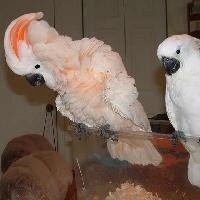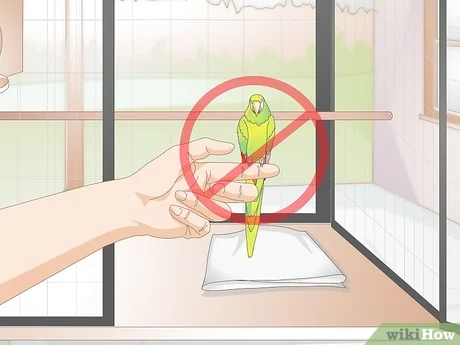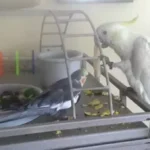Cockatoos can learn to control their bowel movements. With consistent training, they can be taught to go potty in designated areas.
Cockatoos are known for their intelligence and ability to form strong bonds with their human companions, making them excellent candidates for potty training. This process requires patience, routine, and positive reinforcement, just as you would approach training a dog or a cat.
Starting early enhances the likelihood of success, as younger birds are typically more adaptable. Owners dedicated to teaching this behavior will find their efforts rewarded with a cleaner living environment and a more harmonious relationship with their pet cockatoo. Successful potty training can also reduce the amount of time spent on cleaning, allowing for more quality time with your feathered friend.
Cockatoos And Intelligence
Cockatoos shine as some of the brightest birds in the parrot family. Their intelligence amazes pet owners and researchers alike. It’s no wonder that many cockatoo enthusiasts ask: Can these birds be potty trained? The answer lies deeply rooted in their remarkable cognitive abilities.
Evidence Of Cognitive Skills
Cockatoos display a range of behaviors that suggest high levels of intelligence. Here’s some undeniable evidence:
- Problem-solving prowess: They can navigate complex challenges.
- Memory: Their recall ability aids them in remembering important cues.
- Social learning: They observe and mimic the actions of others.
- Tool usage: They use objects to assist in obtaining food.
Potential For Learning
The brain of a cockatoo is wired for learning new tricks and behaviors. This potential extends to potty training with the right approach:
- Patience and consistency are key.
- Positive reinforcement accelerates the process.
- Timing and routine play crucial roles.
- Start training when they are young for the best results.
Success in potty training is not just about repetition. It’s about tapping into their innate curiosity and intelligence. Owners who understand this create a stronger bond with their feathered friends, leading to a compliant and happier pet.

Credit: www.aviatorharness.com
The Concept Of Potty Training Birds
Bird lovers often wonder can their feathered friends learn to use a designated potty. This idea isn’t just wishful thinking. Birds can be potty trained. While it may sound surprising, with patience and consistency, your cockatoo can master this useful skill. Let’s delve into what this involves and compare their training to that of cats and dogs.
Comparisons With Cats And Dogs
Dogs and cats are commonly trained to do their business in specific spots. Cockatoos can follow a similar learning pattern. Training these birds involves recognizing their body language and establishing a routine, much like with puppies or kittens.
- Cats instinctively use a litter box and require minimal training.
- Dogs need scheduled walks and positive reinforcement.
- Cockatoos adapt to cues signaling it’s potty time.
Avian Bathroom Behaviors
Understanding your cockatoo’s natural habits is key to potty training success. Birds usually exhibit specific signs before eliminating, such as squatting or becoming fidgety. Here’s what to know about their bathroom behaviors:
| Behavior | Description | Action |
|---|---|---|
| Squatting | Bird lowers body slightly | Take to potty area immediately |
| Fidgeting | Bird seems restless | Watch for other signs |
| Timing | Often after eating or sleeping | Set a schedule for potty breaks |
Once you identify these behaviors, you can begin establishing a consistent potty routine for your cockatoo.
Starting With The Basics
Welcome to the essentials of cockatoo potty training! Many bird owners wonder if their feathered friends can learn to use a designated “bathroom.” Well, the answer is yes, cockatoos, like many other intelligent birds, can learn this useful skill. This part of the guide will cover the basics to prepare both you and your cockatoo for successful potty training.
Choosing The Right Time
Timing is crucial in potty training a cockatoo. Start when your bird is calm and receptive. Mornings, after a good night’s sleep, or following playtime, when they’re relaxed, are often ideal moments. Remember, patience is key. Younger birds may catch on faster, but with consistent training, adult birds can also succeed.
Understanding Bird Body Language
Observing your cockatoo is vital. Birds communicate through their behavior and movements. When it’s time to go, your cockatoo may become fidgety, squat slightly, or raise its tail. Recognizing these signs allows you to act quickly, encouraging your cockatoo to associate the urge with the correct location. Pay attention and respond with consistency for the best results.

Credit: www.wikihow.com
Setting Up A Potty Training Routine
Cockatoos are among the most intelligent birds, and with the right approach, owners can successfully potty train them. Establishing a potty training routine is essential for creating a clean and hygienic environment for both the bird and the household. In this section, we’ll explore practical steps to implement a routine that works.
Consistency Is Key
Maintaining a regular schedule is crucial for potty training cockatoos. Choose specific times and places for your bird to relieve itself. Here’s a simple table to help you keep track:
| Time | Potty Area |
|---|---|
| Morning Wake-Up | Near the Cage |
| After Meals | Designated Spot |
| Playtime | Same as Above |
| Before Bedtime | Near the Cage |
Stick to these times to help your cockatoo learn faster. Use verbal cues every time your cockatoo goes to the designated potty area. Verbal cues could be simple phrases like “Go potty!”
Positive Reinforcement Techniques
Reward your cockatoo for successful potty use. Use small treats or offer affection to reinforce the behavior.
- Favorites: Identify treats your cockatoo loves.
- Reward: Give a treat immediately after successful potty use.
- Alternate: Mix up rewards to keep your cockatoo engaged.
Remember to give praise! Say phrases like “Good job!” with a cheerful tone. Always avoid punishment if accidents happen. Clean up calmly and continue the routine without fuss.
Common Challenges In Potty Training
When teaching your cockatoo the valuable skill of potty training, you might hit some roadblocks. Like toddlers, cockatoos can have their moments of stubbornness and accidents. But don’t fret! With patience and consistency, you can guide your feathered friend towards cleanliness and hygiene. Let’s dive into the common challenges you might face and how to gracefully tackle them.
Dealing With Accidents
Accidents are part of the learning curve for any potty training journey. Stay calm and don’t scold your cockatoo as it can lead to fear and distrust. Instead, use positive reinforcement when your bird uses the designated potty area. Here’s what you need to keep in mind:
- Clean up messes immediately to prevent bad habits from forming.
- Use pet-friendly cleaners to eliminate odors and stains.
- Monitor your bird’s body language to better predict when it’s time to go.
Remember, consistency is key. Reinforce the correct behavior and stay patient.
Overcoming Stubbornness
Cockatoos can be willful, which means they may resist training at times. Understanding and working with your bird’s personality is crucial. To effectively overcome this challenge, consider these strategies:
- Stick to a regular potty training schedule to build habit.
- Reward your cockatoo with treats or affection for cooperation.
- Keep sessions short and stress-free to avoid overwhelming your pet.
Patience and positive interactions will gradually win your cockatoo over and encourage compliance.

Credit: m.youtube.com
Health Considerations During Training
Becoming a pet parent to a cockatoo brings joy and a few challenges. Potty training is one such challenge. It’s important to do it right. During training, a cockatoo’s health is of utmost concern. Factors like diet and emotional well-being can greatly influence the process. It’s crucial to understand how these factors play a role in successful potty training.
Dietary Impacts
Diet affects your cockatoo’s toilet habits. The right food can make training smooth. Food quality and timing are key. A consistent feeding schedule aids in predicting potty times. Here is how diet impacts potty training:
- Fiber-rich foods lead to regular bowel movements.
- Too many treats can cause frequent urges.
- Water intake influences urination patterns.
Adjust your cockatoo’s diet to aid in predictable potty breaks. Watch for food that upsets their stomach. It might disrupt the training schedule.
Stress And Anxiety Effects
Cockatoos easily get stressed. It’s vital to keep training positive. Stress can lead to health issues. It can also set back potty training. Here’s what to look out for:
- A stressed cockatoo may refuse to potty train.
- Anxiety can cause unpredictable bathroom habits.
- Excessive noise or change in environment may affect their learning.
Consistency and patience are your best tools. Create a safe space for your feathered friend. Use rewards and gentle guidance. Avoid punishments. It will ensure your cockatoo stays happy and healthy through their potty-training journey.
Advanced Potty Training Tips
Advanced Potty Training Tips take cockatoo care to the next level. Once the basics are down, owners can enhance the potty training experience. This leads to a cleaner environment and a happier relationship between you and your feathered friend. With the right strategies, even an old bird can learn new tricks!
Signal Training
Signal training builds a communication bridge between you and your cockatoo. It involves teaching your cockatoo to signal when it’s time to go. This can be a specific sound, action, or both.
- Choose a Signal: A whistle or a word like “potty” works well.
- Consistency is Key: Always use the same signal for association.
- Positive Reinforcement: Reward your cockatoo with treats when it signals correctly.
Expanding Allowed Potty Areas
Once your cockatoo masters potty training in a single spot, you might consider expanding.
- Introduce New Areas: Slowly introduce new areas to avoid confusion.
- Supervise Closely: Watch their cues to guide them to the right spot.
- Limit the Size: Keep potty areas small to start.
- Use Visual Cues: Place recognizable objects near new potty areas.
Training takes time and patience, but it’s worth the effort. A well-trained cockatoo is a more sociable and enjoyable companion.
Realistic Expectations And Limitations
Embarking on the potty training journey with a cockatoo requires patience and proper expectations. It’s crucial to understand the limitations and set realistic goals. Not all birds may grasp or stick to potty training, a factor largely dictated by the species’ disposition and individual personality. Setting the stage for what’s to come helps align your training efforts with achievable outcomes.
Understanding Species Differences
Cockatoos, like people, have unique traits. Some species may show natural tendencies that make potty training easier, while others are less inclined. Recognizing these differences is key to managing your expectations and fostering a successful training relationship.
- Different species adapt to training at varying speeds.
- Individual birds within a species can show different responses.
- Prioritize creating a stress-free environment for learning.
Acceptable Training Outcomes
An understanding of acceptable training outcomes allows you to celebrate small victories. Not every cockatoo will perfectly adhere to potty training, but many can learn to signal when they need to go.
| Outcome | Description |
|---|---|
| Communication of Need | Birds may learn to gesture or vocalize when it’s time. |
| Designated Area Usage | Some may consistently use a specified spot for waste. |
| Timed Intervals | Owners can anticipate and manage their bird’s needs. |
To sum up, successful potty training aligns with individual capabilities and species-specific behaviors. Patience and realistic goals shape a positive learning experience for you and your feathered friend.
Conclusion
Training cockatoos for potty habits is indeed possible. Consistency and patience are key for success. Your feathered friend can learn with positive reinforcement. Start with a routine and praise their progress. A trained cockatoo can be a cleaner, happier companion in your home.
Ryan Everhart is a passionate bird enthusiast and blogger, primarily writing on his website, Avian Whispers. His journey into the world of bird blogging began with a deep interest in parrots, a species that captivated his attention for their intelligence and social behavior. Over time, his content expanded to cover a broader range of bird species, offering insights into bird behavior, care, habitats, and conservation.
Ryan is dedicated to educating his audience, which includes both new bird owners and seasoned enthusiasts. His writing is filled with personal experiences, expert knowledge, and practical advice on bird care. Through Avian Whispers, he aims to foster a deeper appreciation for birds, emphasizing their role in nature and the joys of having them as pets.
Starting with articles focused on parrots, Ryan’s work now encompasses a diverse range of topics such as feeding, training, habitat enrichment, and bird health. His love for birds extends beyond parrots, diving into various avian species. His informative and heartfelt writing reflects his commitment to the well-being of birds and the desire to help others connect with these creatures.
As a growing voice in the bird blogging community, Ryan strives to provide a platform where bird lovers can learn, share experiences, and connect over a shared passion for avian life. His blogs are not only educational but also serve as a reminder of the importance of protecting and nurturing the bond between humans and birds.




